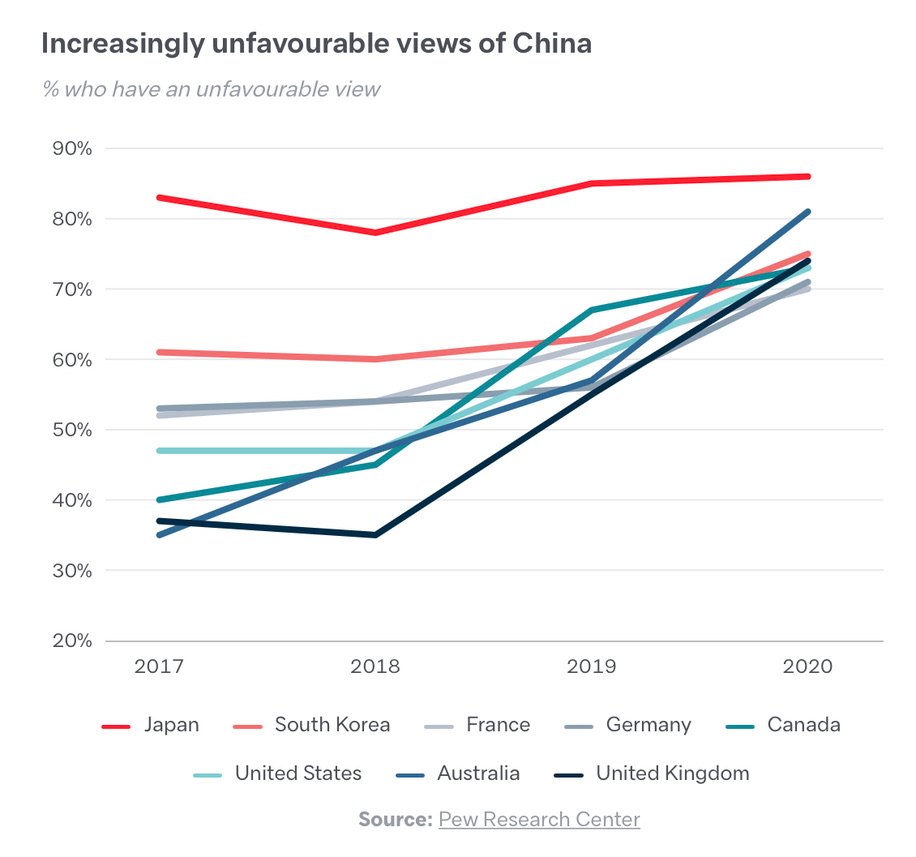What's ahead for Biden in Asia? Here's my take for @LowyInstitute.
Let's go back to the future... In 2016, Biden told an Asian audience: "The better angels in America will prevail." Now it is time to deliver.
Six points drawing on data from Asia: (1/8) https://www.lowyinstitute.org/the-interpreter/back-future-will-biden-s-asia-policy-come-full-circle
Let's go back to the future... In 2016, Biden told an Asian audience: "The better angels in America will prevail." Now it is time to deliver.
Six points drawing on data from Asia: (1/8) https://www.lowyinstitute.org/the-interpreter/back-future-will-biden-s-asia-policy-come-full-circle
The Biden team will have to counter continuing questions about US commitment and credibility.
Many in Asia believe that American engagement and influence is declining. In particular, they worry that Washington is looking inward and increasingly adopting America First logic.
Many in Asia believe that American engagement and influence is declining. In particular, they worry that Washington is looking inward and increasingly adopting America First logic.
But China is in even worse shape internationally; the Communist Party is winning a race to the bottom.
Xi Jinping is unpopular, and unlike Donald Trump, he's not going anywhere soon.
So Joe Biden will have at least a short "window of opportunity" to make some headway in Asia.
Xi Jinping is unpopular, and unlike Donald Trump, he's not going anywhere soon.
So Joe Biden will have at least a short "window of opportunity" to make some headway in Asia.
Yet shifting alignments in Asia will pose a real challenge.
Washington will have to reengage with ASEAN and others without appearing to downgrade the Quad.
In other words, the United States needs to put Asia back at the heart of its Indo-Pacific strategy.
Washington will have to reengage with ASEAN and others without appearing to downgrade the Quad.
In other words, the United States needs to put Asia back at the heart of its Indo-Pacific strategy.
The Biden team comes in with some real advantages, but they will have to answer three tough questions:
First, can the United States devote more attention to Asia given that most Americans' immediate priority is addressing our serious problems here at home?
First, can the United States devote more attention to Asia given that most Americans' immediate priority is addressing our serious problems here at home?
Second, can the United States craft a positive regional trade and investment strategy?
Trump's attacks made trade more, not less, popular. But that doesn't mean a revised Trans-Pacific Partnership deal would sail through Congress. Still, Washington can't beat RCEP with nothing.
Trump's attacks made trade more, not less, popular. But that doesn't mean a revised Trans-Pacific Partnership deal would sail through Congress. Still, Washington can't beat RCEP with nothing.
Third, can the United States deter China and reassure regional allies and partners with flat or falling defense resources?
The Biden team has some innovative ideas, but it will be hard to argue that Washington can "do more with less" if Beijing continues "doing more with more."
The Biden team has some innovative ideas, but it will be hard to argue that Washington can "do more with less" if Beijing continues "doing more with more."
What does this all mean? The Biden team will have a critical window of opportunity in Asia. But it will have to draw on the pivot's lessons without being circumscribed by them.
Read the full piece here! (8/8) https://www.lowyinstitute.org/the-interpreter/back-future-will-biden-s-asia-policy-come-full-circle
Read the full piece here! (8/8) https://www.lowyinstitute.org/the-interpreter/back-future-will-biden-s-asia-policy-come-full-circle

 Read on Twitter
Read on Twitter







